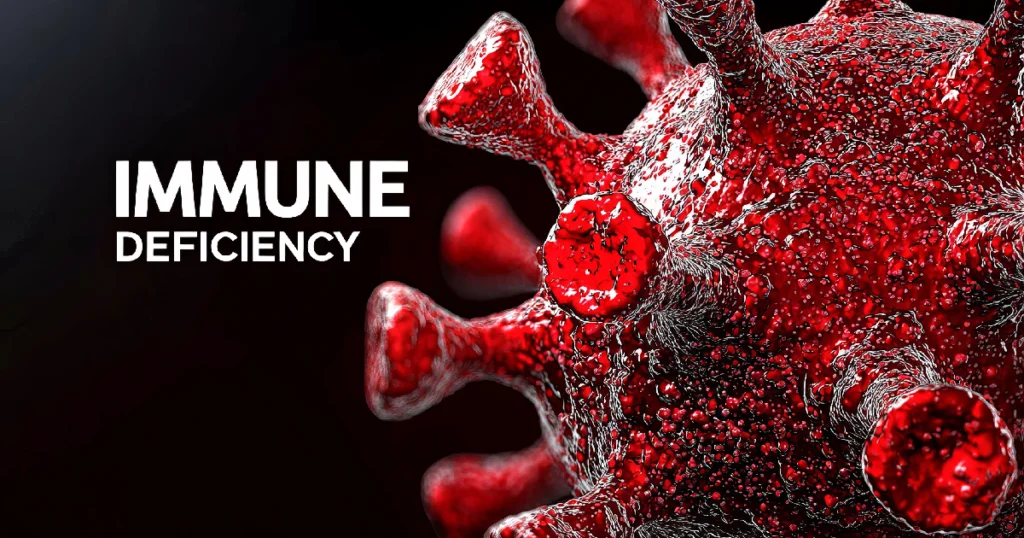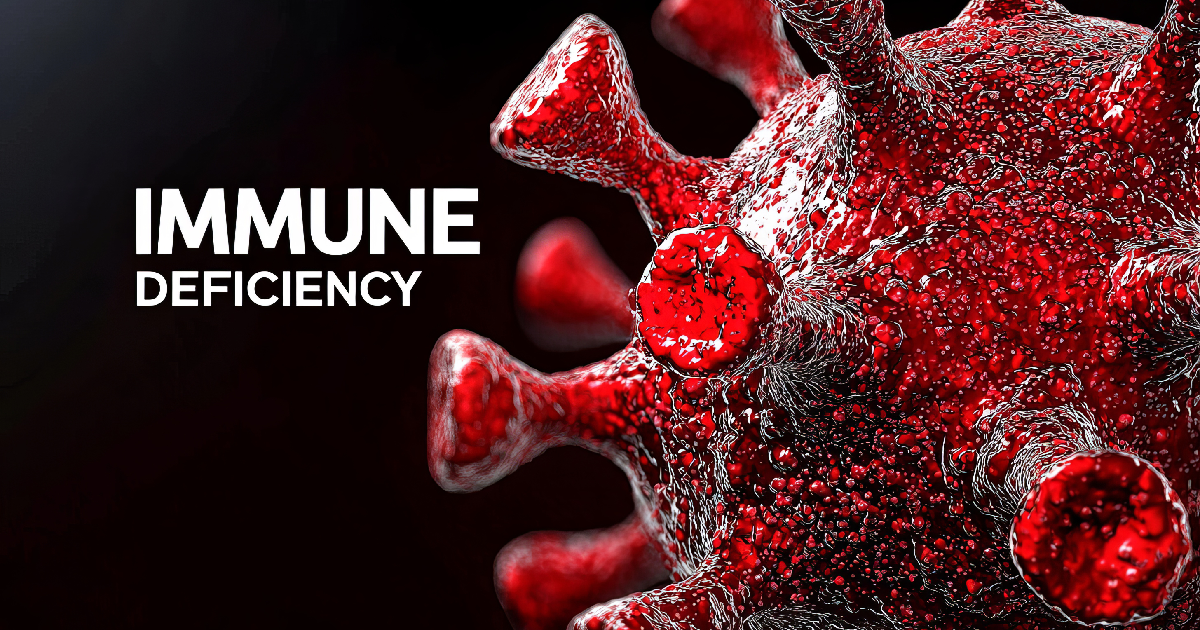
Table of Contents
A strong immune system is your body’s first line of defense against illness. But what happens when it’s not working like it should? Immunodeficiency is a condition that weakens your immune response and leaves you more vulnerable to infections and chronic disease.
Immunodeficiency isn’t something to ignore, whether it’s due to a genetic issue or an illness that develops over time. Understanding the signs, causes, and treatment options can make all the difference in managing this condition and improving quality of life.
What Is Immunodeficiency?
Immunodeficiency is a medical condition in which the immune system doesn’t function properly. This can be due to a lack of certain immune cells, proteins, or antibodies needed to fight infections. Even common illnesses can become serious threats without a fully functional immune system.
Primary vs. Secondary Immunodeficiency
There are two main types of immune system disorders:
1. Primary Immunodeficiency
This form is inherited and usually presents early in life. It results from genetic defects that affect how the immune system develops or functions. Examples include Common Variable Immunodeficiency (CVID) and severe combined immunodeficiency (SCID).
2. Secondary Immunodeficiency
This is acquired later in life due to external factors. Causes may include infections like HIV, cancer treatments such as chemotherapy, chronic illnesses, or long-term use of immunosuppressive medications. Secondary immunodeficiency is far more common than primary types.
Recognizing the Signs of a Weakened Immune System
It’s easy to dismiss frequent sniffles or stomach bugs as bad luck, but they may be telling you more than you think. A weakened immune response can manifest in various ways, often overlapping with other health issues. Here are some red flags to watch for:
Low Immune System Symptoms
- Frequent respiratory infections (bronchitis, sinusitis, pneumonia)
- Chronic or recurring sinus infections
- Persistent skin infections or rashes
- Digestive problems, such as chronic diarrhea
- Slow wound healing
- Fatigue or general weakness
- Unexplained fevers
If you or someone you care about is experiencing these symptoms repeatedly, it might be time to consult a specialist.
Common Causes of Immunodeficiency
Knowing what causes immunodeficiency is a critical step in managing it. The root issue can be addressed or better controlled in many cases.
1. Genetic Disorders
Certain inherited conditions prevent the immune system from developing correctly. These are often diagnosed in childhood and require lifelong management.
2. Infections
Viruses like HIV directly attack immune cells, significantly weakening the body’s defenses.
3. Medications
Drugs used to treat cancer, autoimmune diseases, or organ transplant recipients can suppress immune function.
4. Chronic Illnesses
Conditions like diabetes, kidney disease, and malnutrition may weaken your immune response over time.
5. Aging
As we age, our immune systems naturally become less effective, increasing the risk of secondary immunodeficiency.
How Is Immunodeficiency Diagnosed?
Diagnosis usually starts with a detailed medical history and physical exam, focusing on patterns of infections and general health. However, several tests are often required to truly understand what’s going on beneath the surface.
Diagnostic Tests for Immune System Disorders
- Blood tests measure white blood cells, antibodies, and other immune markers.
- Immunoglobulin levels to check for deficiencies in infection-fighting proteins.
- Lymphocyte function tests to evaluate how well immune cells respond to threats.
- Genetic testing to identify inherited immune disorders.
- Imaging tests (in some cases) to detect organ damage or abnormalities related to repeated infections.
By combining these results, healthcare providers can pinpoint the type and severity of immunodeficiency and tailor a treatment for immunodeficiency.
What Are The Treatments for Immunodeficiency?
Managing immunodeficiency means more than just treating infections as they pop up. It’s about building a long-term plan to protect health and improve resilience.
Medications and Therapies
- Antibiotics, antivirals, and antifungals: Used preventatively or to treat existing infections.
- Immunoglobulin replacement therapy (IVIG): A powerful option for those with low antibody levels.
- Stem cell transplantation: Reserved for severe, life-threatening cases of primary immunodeficiency.
- Targeted medications: In cases where immune deficiencies are linked to other conditions, drugs that treat the underlying disease may also help the immune system rebound.
Immune Boosting Therapies
In addition to direct treatments, some supportive therapies can help enhance overall immune health:
- Vitamin and mineral supplements (especially Vitamin D, Zinc, and B12)
- Healthy diet plans designed to strengthen immunity
- Stress reduction techniques like mindfulness and therapy
- Exercise programs tailored for individuals with chronic illness
Why Is Early Intervention Important?
Ignoring the signs of immunodeficiency can result in more serious complications, such as organ damage, chronic infections, or even cancer. However, with early diagnosis and the right treatment plan, many people can live full, active lives with minimal disruptions.
At Omega Health Clinics, our team specializes in diagnosing and managing immune system disorders. If you’ve been feeling run down more often than usual or are dealing with a string of illnesses that just won’t quit, it may be time to take a closer look.
Why Treating Immunodeficiency Matters
Taking action isn’t just about avoiding the flu. There are long-term benefits that can significantly improve your well-being.
Benefits of Treatment
- Fewer and less severe infections
- Reduced hospital visits
- Improved daily energy levels
- Better control of other chronic conditions
- Less reliance on antibiotics
- Enhanced vaccine response
- Improved overall life expectancy
- Greater peace of mind with regular monitoring
When managed correctly, immunodeficiency doesn’t have to take over your life.
Why Choose Omega Health Clinics for Immunodeficiency in Modesto, CA?
Omega Health Clinics provides comprehensive care for those living with immunodeficiency in Modesto, CA. Our clinic offers in-depth assessments, personalized treatment plans, and continuous support for patients who need help managing a weakened immune response. Whether you’re dealing with recurring infections or don’t feel like yourself anymore, we’re here to help you get back on track.
We understand that no two immune disorders are alike. That’s why we take the time to learn about your history, symptoms, and goals for better health.
Don’t Let a Weak Immune System Slow You Down – Book an Appointment
If frequent infections are hindering your everyday life, it’s time to take action. Omega Health Clinics is your trusted provider for immunodeficiency in Modesto, CA. With expert care and evidence-based treatments, we’ll help you build a stronger defense and enjoy a healthier future.
Don’t wait for your symptoms to get worse—Contact us today and take control of your immune health.





